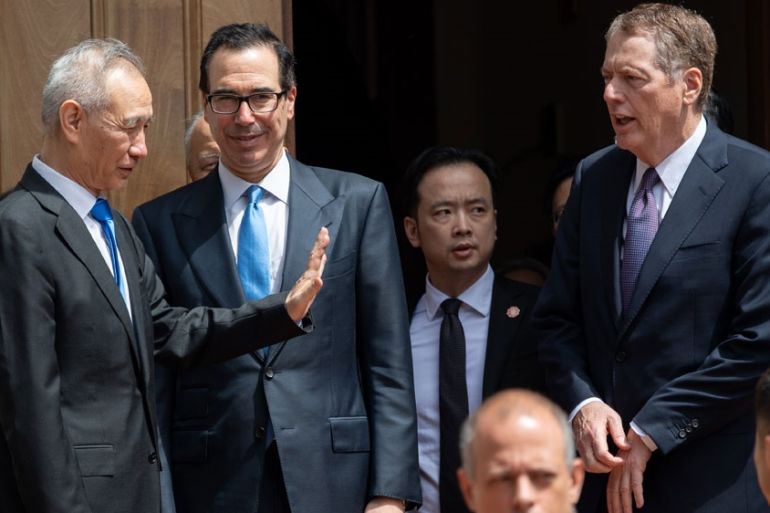China vows not to compromise on principles as US trade talks end
Two days of US-China trade talks end without a deal with Beijing pointing to sticking points about ‘crucial’ principles.

China‘s lead negotiator has said Beijing will not compromise on its principles as two days of trade talks between the United States and China have broken up with no agreement.
Speaking on Friday after his meeting in Washington with US Trade Representative Robert Lighthizer and Treasury Secretary Steven Mnuchin, China’s Vice President Liu He said the sticking points in the negotiations were about “crucial” matters regarding principle.
Keep reading
list of 4 itemsBiden labels Japan and India ‘xenophobic’ along with China and Russia
KFC Malaysia temporarily closes outlets amid Gaza boycott
Turkey says it halts trade with Israel over Gaza aid access
But Liu told reporters the talks had been “productive” and said the two sides would meet again in Beijing at an unspecified date.
“Negotiations have not broken down, but rather on the contrary, this is only a normal twist in the negotiations between the two countries. It is inevitable,” Liu said. “We have a consensus in lots of areas but to speak frankly there are areas we have differences on, and we believe these concern big principles.”
Liu pointed to three major areas of disagreement: whether to cancel all punitive tariffs when an agreement is reached, the exact size of Chinese purchases of US goods, and a “balanced” agreement text.
“Any country needs its own dignity, so the text must be balanced,” he said.
Liu and China’s President Xi Jinping cannot be seen as giving in too much with trade concessions to the US in fear of triggering comparisons to past “unequal treaties” forced on China in the 19th and 20th centuries.
“Every country has important principles, and we will not make concessions on matters of principle,” Liu said.
Growing tariffs
The development came shortly after US President Donald Trump more than doubled tariffs on $200bn in Chinese imports, raising them to 25 percent from 10 percent.
“The president … ordered us to begin the process of raising tariffs on essentially all remaining imports from China, which are valued at approximately $300bn,” US Trade Representative Robert Lighthizer said in a statement.
|
|
They were not expected to go into effect for several months.
Liu had warned earlier that Beijing “must respond” to any US tariffs.
Trump continues to argue that tariffs could in some ways be preferable to reaching a trade deal.
“Tariffs will bring in FAR MORE wealth to our country than even a phenomenal deal of the traditional kind,” Trump wrote.
Since last year, the US and China have exchanged tariffs on more than $360bn in two-way trade, weighing on both countries’ economies.
Al Jazeera’s Adrian Brown, reporting from Beijing, said there was pressure on both sides.
“There is pressure on Trump supporters who fill their homes with so many Chinese products,” he said. “But China is worried as well, because its economy is continuing to slow and President Xi Jinping is also aware that Trump has the support of the Democrats on this issue.”
Economists stress that duties are paid by US companies and consumers and result in higher prices, while farmers and manufacturers complain about the loss of markets for their exports due to retaliation from China and other targets of Trump’s trade wrath.
Trump began the standoff because of complaints about Chinese trade practices perceived as unfair. Washington is pressing China to change its policies on protections for intellectual property, as well as massive subsidies for state-owned firms, and to reduce a widening trade deficit.
|
|